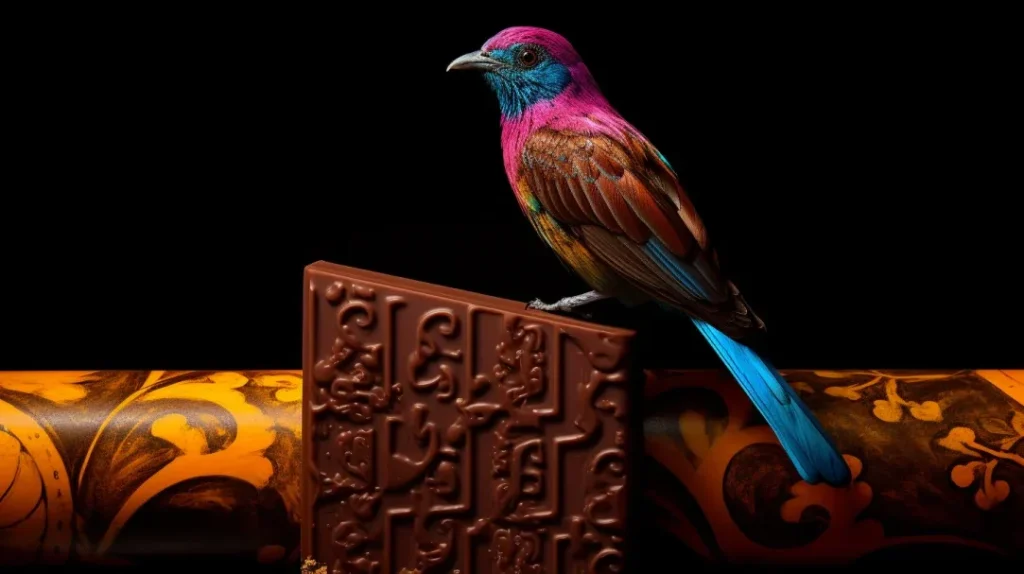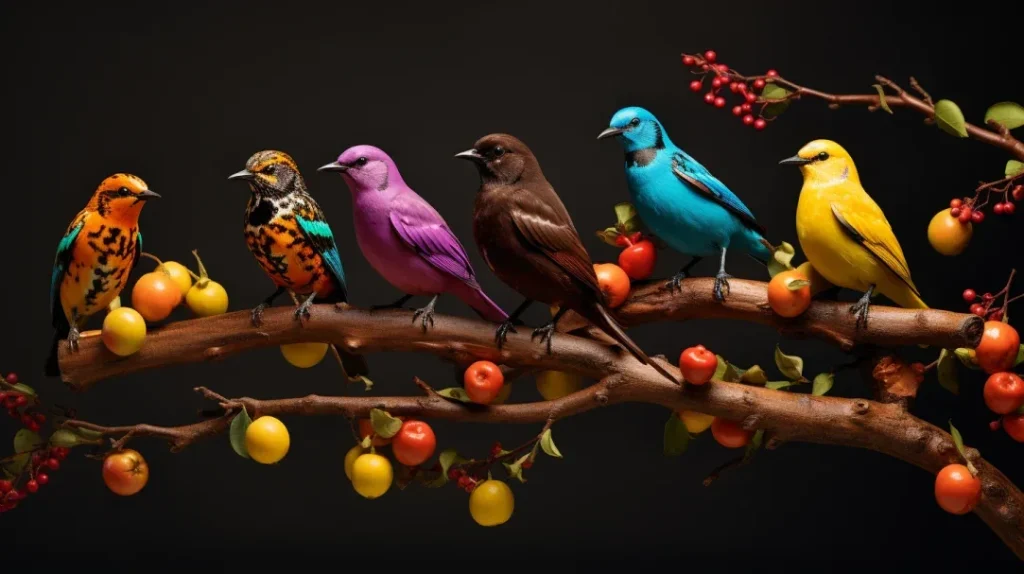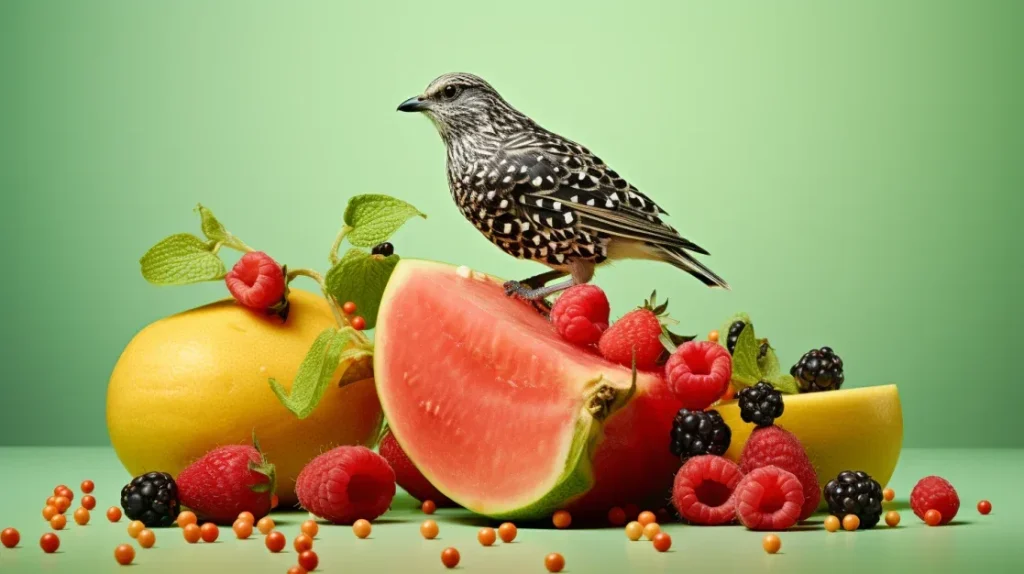Table of Contents
Have you ever been tempted to share your chocolate treat with your feathered friend? Can birds eat chocolate? While it may seem harmless, you should think twice before offering chocolate to your bird.
Chocolate can be a dangerous temptation for our avian companions. This article will explore the potential dangers of chocolate for birds, the symptoms of chocolate poisoning, and ways to prevent accidental consumption.
Stay informed and keep your feathered friend safe from the allure of chocolate.
Key Takeaways Of “Can Birds Eat Chocolate”
- While chocolate may be a tempting treat for humans, it is essential to remember that it is toxic to birds. The theobromine and caffeine content in chocolate can harm a bird’s health, including increased heart rate, digestive issues, and even death in severe cases.
- Chocolate is highly toxic to birds due to the presence of theobromine.
- Even a small amount of chocolate can cause symptoms such as increased heart rate, hyperactivity, tremors, and bird seizures.
- Birds’ small size makes them more susceptible to the toxic effects of chocolate.
- Consuming chocolate can lead to gastrointestinal problems, cardiac arrest, and even death in birds.
What Is Chocolate?
Chocolate is a sweet treat many humans love, but can birds enjoy it too? Unfortunately, chocolate is not safe for our feathered friends. Both dark chocolate and milk chocolate contain theobromine, a substance that is toxic to birds. When birds ingest chocolate, it can cause chocolate poisoning.
The theobromine in chocolate affects a bird’s central nervous system and can lead to symptoms like an increased heart rate, elevated blood pressure, and even kidney failure. Birds have different digestive systems and metabolisms than humans, making it difficult to process certain foods.
While it may be tempting to share a sweet treat with your pet bird, it’s best to stick to their regular diet of bird seed, fruits, and vegetables. Plenty of healthy snacks and treats are safe for birds, such as green beans, cooked beans, and raw potatoes. These options provide necessary nutrients without the risk of chocolate poisoning.
Keep your feathered friend happy and healthy by offering them a variety of foods that support their immune system and overall well-being. Avoid dangerous temptations like chocolate and opt for bird-friendly options that boost vitamins and minerals.
The Sweet Temptation of Chocolate for Birds
While chocolate may be a sweet temptation for humans, it can be hazardous for our feathered friends. Birds cannot metabolize theobromine, a substance found in chocolate, as efficiently as humans can. This can lead to serious health issues for them. Chocolate ingestion can affect the central nervous system, causing symptoms like increased heart rate, high blood pressure, and even kidney failure.
To keep our birds safe and healthy, it’s best to avoid giving them chocolate. Stick to their regular diet of bird seed, fruits, and vegetables. Birds can enjoy many other tasty and nutritious treats without harm, such as green beans, cooked beans, and raw potatoes. These options provide essential nutrients without the risk of chocolate poisoning.
Remember, when it comes to our feathered friends, it’s essential to resist the sweet temptation of chocolate and opt for safe and healthy snacks instead.
The Potential Dangers of Chocolate for Birds
Sweet foods and favorite treats can be tempting, but consuming them in moderation is essential, especially for those concerned about their health and blood sugar levels. Excessive consumption of sugary treats has been linked to various health issues, including heart disease, liver failure, and damaging effects on organ systems. Birds and pet owners should also be cautious, as sweet snacks and certain fruits, like those with pits, can harm their feathered or furry companions. It’s essential to prioritize a balanced diet and consult with healthcare professionals or veterinarians for guidance on maintaining both human and pet health.
The reason chocolate is harmful to birds is due to a compound called theobromine, which is found in cocoa beans. This compound is virtually harmless to humans but can be toxic to wild birds. The theobromine in chocolate affects a bird’s heart rate and can damage red blood cells, leading to serious health complications.
If a bird consumes chocolate, they may experience symptoms of chocolate poisoning. These can include vomiting, diarrhea, rapid breathing, increased heart rate, and increased blood pressure. In severe cases, consuming chocolate can lead to kidney failure and death.
To protect our feathered friends, avoiding giving them any chocolate at all is best. Instead, focus on providing them with healthy delicious treats that are safe for their digestive and immune systems. Green beans, cooked beans, and raw potatoes are all excellent options that offer a boost of vitamins and nutrients without any risks.
If you want to spoil your bird with a sweet treat, plenty of safe alternatives are available. Fruits like apples, bananas, and strawberries are delicious and healthy snacks for your feathered friend. Just make sure to remove any seeds or pits that could be harmful.
Remember, the health and well-being of our avian companions should always come first. By avoiding chocolate and providing them with a varied and nutritious diet, we can keep them happy and healthy for years. So please resist the temptation to share your chocolate with your bird and opt for their favorite bird toys or a fun bird perch. They’ll appreciate the extra love and attention, and you’ll have peace of mind knowing they’re staying safe and healthy.
Understanding the Toxicity of Chocolate for Avian Species

Birds can be affected by the toxicity of chocolate due to the presence of theobromine in their system. Theobromine is a chemical compound found in chocolate that’s toxic to many animals, including birds. When birds consume chocolate, it can lead to various digestive issues and potentially fatal consequences.
Here are three key points to understand about the toxicity of chocolate for avian species:
- Theobromine sensitivity: Birds are susceptible to theobromine. Even small amounts of chocolate can cause adverse effects on their bodies.
- Digestive issues: Consumption of chocolate by birds can result in gastrointestinal problems, such as vomiting, diarrhea, and abdominal pain.
- Potential fatalities: In severe cases, theobromine toxicity can lead to death in birds. It’s essential to prevent birds from accessing chocolate to ensure their well-being.
Understanding the toxic effects of chocolate on birds is crucial to protect these avian species from potential harm.
Common Symptoms of Chocolate Poisoning in Birds
As a responsible bird owner, knowing the common symptoms of chocolate poisoning in birds is crucial. These warning signs may include vomiting, diarrhea, increased heart rate, and seizures.
If you notice these symptoms, immediate veterinary intervention is necessary to ensure your bird’s well-being. Ignoring the signs can lead to long-term health consequences and potentially fatal outcomes for your feathered friend.
Warning Signs of Poisoning
If your feathered friend consumes chocolate, look for common symptoms of chocolate poisoning. Birds aren’t equipped to digest chocolate properly, and their small size makes them more susceptible to its toxic effects. Here are some warning signs to watch out for:
Gastrointestinal Disturbance:
- Vomiting
- Diarrhea
- Excessive drooling
- Nervous System Effects:
- Restlessness
- Tremors or seizures
- Abnormal behavior or vocalization
- Cardiac and Respiratory Symptoms:
- Rapid breathing
- Increased heart rate
- Weakness or collapse
If you notice any of these symptoms in your bird after chocolate consumption, seeking immediate veterinary attention is crucial. Chocolate poisoning can lead to severe health complications, including organ damage and death.
Immediate Veterinary Intervention
If your bird exhibits these symptoms after consuming chocolate, you should immediately seek veterinary assistance. Time is of the essence when it comes to chocolate poisoning in birds, as prompt and appropriate intervention can significantly increase the chances of a positive outcome.
The urgency lies in providing immediate treatment and emergency care to counteract the harmful effects of theobromine and caffeine, two toxic substances in chocolate. Common symptoms of chocolate poisoning in birds include increased heart rate, restlessness, tremors, seizures, vomiting, diarrhea, and, in severe cases, cardiac arrhythmias and respiratory distress.
It’s crucial to remember that chocolate toxicity can be fatal for birds, and only a veterinarian can accurately diagnose and provide the necessary treatment to save your feathered friend’s life.
Long-Term Health Consequences
You should be aware that long-term health consequences can arise if your bird regularly consumes chocolate, as it can lead to chronic symptoms of chocolate poisoning. While an occasional nibble may not cause significant harm, continuous exposure to chocolate can pose severe risks to your bird’s well-being.
Here are some potential long-term health risks associated with chocolate consumption in birds:
- Obesity: Birds can become obese from chocolate’s fat and sugar content. Weight gain can cause heart disease and joint problems.
- Digestive disorders: The ingredients in chocolate, such as theobromine and caffeine, can disrupt the digestive system of birds. This may result in diarrhea, vomiting, and other gastrointestinal issues.
- Potential addiction: Chocolate contains substances that can create a dependency on birds, leading to an unhealthy craving for this sweet treat. Over time, this addiction can negatively impact their overall health and well-being.
To ensure the long-term health of your feathered friend, it’s best to avoid feeding them chocolate altogether.
The Impact of Chocolate on Bird Digestive Systems

When it comes to birds and chocolate, their digestive systems aren’t equipped to handle this sweet treat. Chocolate contains theobromine, a compound that can be toxic to birds and interfere with their digestion.
Consuming chocolate can lead to various digestive issues for birds, causing discomfort and potentially severe health problems.
Bird Chocolate Toxicity
Unfortunately, birds can’t safely digest chocolate. Bird chocolate consumption can lead to chocolate toxicity in avian species. Theobromine and caffeine are the primary toxic components in chocolate for birds. Here are three key reasons why chocolate is toxic to birds:
- Theobromine: Chocolate contains high levels of theobromine, which is toxic to birds. Birds lack the enzyme necessary to metabolize theobromine, leading to its accumulation in their system.
- Caffeine: Another component of chocolate, caffeine, can cause severe health problems in birds. It can affect their central nervous system, leading to hyperactivity, tremors, and an increased heart rate.
- Toxicity levels: Birds are susceptible to the toxic effects of theobromine and caffeine.
Understanding the toxicity of chocolate in birds is crucial to prevent accidental ingestion and potential harm. However, what specific digestive issues do birds face from chocolate?
Digestive Issues From Chocolate?
Since birds lack the necessary enzymes to break down chocolate, it can cause digestive issues in their systems. Chocolate contains theobromine, which can kill birds by causing vomiting and diarrhoea. When birds consume chocolate, their digestive systems struggle to break down the theobromine, resulting in discomfort and potential health complications.
It’s crucial to prevent accidents by ensuring that chocolate isn’t accessible to birds, especially in areas where they’re commonly found, such as gardens or outdoor spaces. Raising awareness about the dangers of chocolate for birds can help educate people about the importance of keeping these sweet treats away from our feathered friends. By doing so, we can protect the well-being of birds and prevent any unnecessary digestive issues caused by chocolate consumption.
Can Birds Develop Chocolate Addiction

Can birds develop a chocolate addiction? While birds aren’t expected to build habits as humans do, certain factors can contribute to their repetitive behavior towards chocolate.
Here are three reasons why birds may exhibit addictive behavior towards chocolate:
- Bird Behavior: Birds are naturally curious creatures attracted to brightly colored objects. The vibrant colors of chocolate can entice them to seek it out repeatedly.
- Chocolate Toxicity: Chocolate contains theobromine, a toxic substance to birds. However, some birds may develop a tolerance to low levels of theobromine, leading to cravings for chocolate.
- Dopamine Release: When birds consume chocolate, it triggers the release of dopamine in their brains, which can create a pleasurable sensation. This can reinforce their desire for chocolate and potentially contribute to addictive behavior.
Transitioning into the next section, let’s explore alternatives: safe bird treats.
Exploring Alternatives: Safe Treats for Birds

While it’s important to avoid feeding birds chocolate, you can offer plenty of alternative sweet treats to your feathered friend. Instead of giving them chocolate, which can be toxic to them, consider these healthy alternatives:
1. Fresh fruits: Birds love the natural sweetness of apples, berries, and melons. Just remember to remove any seeds or pits that could be harmful.
2. Vegetables: Offer your bird a variety of veggies like carrots, cucumbers, and bell peppers. These provide essential nutrients without the risk of chocolate toxicity.
3. Bird-safe treats: Look for specially formulated bird treats that are safe and healthy for your feathered friend. These can include fortified seed mixes, dried fruits, or even bird-friendly biscuits.
4. Homemade bird treats: Get creative in the kitchen and use ingredients like oats, dried herbs, and unsalted nuts. Just avoid using any chocolate or toxic foods.
Remember, birds have different dietary needs than humans, so it’s essential to research and consult with a veterinarian to ensure you provide a balanced diet for your feathered friend. By offering alternative sweet treats, you can keep your bird healthy and happy without the risk of chocolate poisoning.
Tips for Preventing Accidental Chocolate Consumption by Birds
To keep your feathered friends safe, it’s essential to take precautions to prevent accidental chocolate consumption by birds. Chocolate contains theobromine, a toxic substance for birds that can lead to various health issues, including heart problems and even death. Here are some tips to help you protect your avian companions:
- Store chocolate securely: Keep all chocolate products in sealed containers and store them in bird-proof cabinets or high shelves.
- Educate family members and guests: Inform everyone in your household about the dangers of chocolate for birds and ensure they understand the importance of not feeding it to them.
- Provide bird-friendly alternatives: Offer your birds safe and healthy treats like fresh fruits, vegetables, or commercially available bird treats specifically made for their dietary needs.
Educating Others: Spreading Awareness About the Dangers of Chocolate for Birds
Spread awareness about the dangers of chocolate for birds by sharing information with your friends, family, and community. Educating others is crucial in preventing accidental consumption of chocolate by birds. By understanding the harmful effects of chocolate on birds’ health, people can make informed choices and take necessary precautions to protect these beautiful creatures.
One effective way to spread awareness is by educating children about the dangers of chocolate for birds. Teach them about the harmful substances in chocolate, such as theobromine and caffeine, which can be toxic to birds. Please encourage them to share this knowledge with their friends and classmates, creating a ripple effect of awareness.
It is also essential to provide bird-safe alternatives for feeding, such as seeds, fruits, and vegetables. Promoting these alternatives ensures that birds receive the necessary nutrition without the risk of chocolate poisoning.
By sharing information and educating others, we can make a significant difference in protecting birds from the dangers of chocolate. Together, let’s create a safer environment for our feathered friends.
| Educational Efforts | Impact |
|---|---|
| Distribute informational brochures | Increases awareness and knowledge |
| Organize workshops or presentations | Provides in-depth understanding |
| Share articles and resources on social media | Reaches a wider audience |
| Collaborate with local schools or community centers | Engages children and their families |
| Encourage bird-safe feeding practices | Promotes responsible behavior |
Responsible Ownership: Making Informed Decisions About Bird Treats
When choosing bird treats, it’s essential to make informed decisions to ensure the well-being of your feathered companion. While chocolate is off-limits for birds, plenty of safe and healthy alternatives can be enjoyed.
To promote bird health, consider incorporating the following bird treat alternatives into your feathered friend’s diet:
| Treat | Benefits |
|---|---|
| Fresh fruits | Provides essential vitamins and minerals |
| Leafy greens | Rich in antioxidants and fiber |
| Nuts and seeds | High in protein and healthy fats |
| Whole grains | Good source of carbohydrates and B vitamins |
Frequently Asked Questions
Can Birds Eat White Chocolate?
White chocolate may seem harmless, but it can be a dangerous temptation for birds. Consuming white chocolate can pose health risks, so it’s best to avoid it. Instead, opt for bird-friendly treats like fruits or seeds.
How Much Chocolate Is Considered Toxic for Birds?
Chocolate can be toxic for birds, as it contains theobromine, which affects their central nervous system and can lead to seizures and even death. The effects of chocolate on other animals vary, but it is generally unsafe. Is chocolate toxic for insects?
Are All Bird Species Equally Susceptible to Chocolate Poisoning?
Birds’ reactions to different types of chocolate and factors that may affect chocolate toxicity in birds vary among species. Some birds may be more susceptible due to their size, metabolism, and sensitivity to theobromine.
What Should I Do if My Bird Accidentally Consumes Chocolate?
If your bird accidentally consumes chocolate, it’s essential to act quickly. Monitor their behavior for any signs of distress, and contact a veterinarian immediately. In the future, opt for safe treats like fruits or seeds.
Are There Any Long-Term Effects of Chocolate Consumption on Birds?
Long-term health risks for birds who consume chocolate include potential toxicity and digestive issues. It is best to avoid giving chocolate to birds altogether. Instead, consider offering them safe alternatives such as fruits or seeds.
Conclusion
In conclusion, bird owners must be aware of the potential dangers of chocolate for avian species. The toxicity of chocolate can have severe consequences on birds’ digestive systems, leading to poisoning symptoms.
Preventing accidental chocolate consumption by birds is essential through responsible ownership and educating others about the dangers. If your bird consumes chocolate, seeking immediate veterinary assistance is crucial.
By making informed decisions about bird treats, we can ensure the well-being and safety of our feathered friends.



